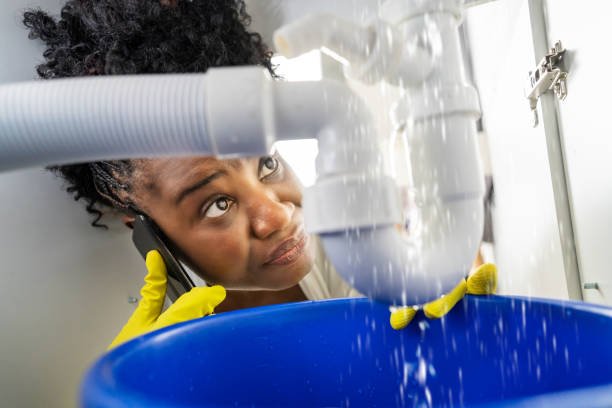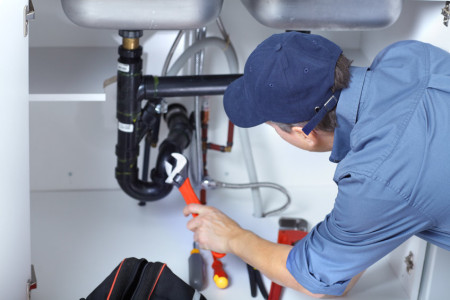Quick Solutions for Pipe Problems: Steps to Take Until Help Arrives
Quick Solutions for Pipe Problems: Steps to Take Until Help Arrives
Blog Article
Presented here in the next paragraphs yow will discover some first-rate ideas relating to What to Do While Waiting for an Emergency Plumber.

Plumbing emergencies can strike at any moment, creating stress and anxiety and potential damage to your home. Whether it's a burst pipe, a blocked drainpipe, or a leaking tap, recognizing just how to take care of the situation until a professional plumber arrives can save you from further problems. This short article offers vital emergency situation pipes ideas to assist you alleviate damages and gain back control throughout a pipes dilemma.
Shut off the Supply Of Water
The primary step in any plumbing emergency is to shut off the water supply. For local concerns, such as a dripping tap or bathroom, shut off the valve near the fixture. In the case of a significant leakage or ruptured pipeline, find your home's primary water shut-off valve and turn it off immediately. Recognizing the place of these valves beforehand can save beneficial time throughout an emergency situation.
Turn off Your Water Heater
In certain emergency situations, such as a ruptured pipeline, it's a good idea to shut off your hot water heater. This stops overheating or damage to the device when water quits streaming. Turn off the power supply to the hot water heater (electrical or gas) and let it cool down to stay clear of possible risks.
Temporarily Quit a Burst Pipeline
A burst pipe can cause significant water damages in minutes. To minimize the problem:
Call an expert plumbing professional right away to resolve the issue completely.
Have an Emergency Pipes Kit
Prepare a fundamental pipes emergency set to handle minor concerns properly. Your kit must consist of:
Having these devices on hand can make a considerable distinction in your ability to handle emergency situations.
Unclog Drains Pipes Safely.
A stopped up drainpipe can be a frustrating and messy problem. Below's how to tackle it:.
If these methods don't work, prevent utilizing too much pressure, as it might worsen the blockage.
Handle Overflowing Toilets.
An overflowing bathroom can trigger prompt disorder. Below's what you should do:.
Address Tiny Leakages with Momentary Repairs.
Little leaks can rapidly become significant problems if left unchecked. Use these short-lived solutions up until professional aid gets here:.
While these fixes aren't long-term, they can help minimize water loss and damages.
Manage Frozen Pipeline Carefully.
In cooler climates, frozen pipelines are a typical emergency. If you believe an icy pipe:.
Know When to Call a Specialist.
While quick fixes can assist momentarily, specific plumbing concerns require prompt expert focus. Call a plumbing technician if:.
Promptly calling a professional makes sure the concern is fixed appropriately and avoids more complications.
Stop Further Damage.
Taking fast action to lessen damages can save you money and time in the future. Here's exactly how:.
Final thought.
Pipes emergency situations can be overwhelming, however with the ideal expertise and tools, you can manage the circumstance properly until help shows up. By switching off the water, addressing small leaks, and utilizing short-lived fixes, you can minimize damage and keep your home safe. Keep in mind, these ideas are short-lived solutions; always speak with a certified plumbing technician to take care of the origin of the problem. Preparation and quick thinking are your finest allies in any type of plumbing emergency.
8 Helpful Tips for Managing Plumbing Emergencies at Home
If your plumbing system hasn’t failed once, wait for it because almost everyone has a story to tell. Sometimes, it could be simple emergencies such as a leaking pipe, a blocked cistern, or even a big burst pipe. In situations like this, you need to have some handy tips to save you some money and from possible damages.
Take care of minor issues early.
Sometimes, you could have avoided an emergency by taking proactive measures while it was still early. Some major plumbing emergencies can be a result of an ignored minor issue. We recommend that you have items like plumbing tapes and other related items. A plumbing tape can allow you to manage minor leaks before the plumber arrives.
Cut off the water supply.
This tip is essential in almost any type of leakage problem. For problems like minor leakages in the toilet or kitchen, turn off the supply that takes water to the affected pipes. If the leakage is a major pipe, you must shut off the supply valve to the entire building. This will help you avoid flooding your home and neighbors if you share a flat.
Know your plumbing system
Folks typically move into a new apartment without understanding the water supply around the building. This can prove disastrous if a water emergency arises and the plumber is far away. The previous tip will prove useless if you don’t practice this one. More importantly, know where your water shut-off valve is located – you’ll need that knowledge to prevent potential home floods.
Have some common handy tools
There are lots of plumbing emergencies that you can handle without hiring a plumber. That’s why you must keep some tools available always. Some tools that you can use to fix simple plumbing emergencies easily include plumbing tapes, screwdrivers, thread seal tapes, plungers, pliers, tape measures, and rubber gloves.
Insulate your pipes from cold
You’ll save yourself from many plumbing expenses if you protect your water pipes from the cold. This is because of the harmful effects that cold weather can have on your pipes. During winter, your pipes can burst from being overly expected to freezing temperatures. So, make sure insulators are there to keep the pipes working correctly.
Avoid practices that will clog your toilet.
Many people indulge in practices that can damage the plumbing system of the entire building. One of these is when they use their toilet to dispose-off garbage. They flush all kinds of things, such as paper towels, bandages, hairs, female sanitary products, etc., down the toilet. This will block your toilet in the long run, incurring unnecessary expenditures. Dump such waste in the trash instead.
Check your dials regularly.
Sometimes, there could be leakages in your home without noticing them in time. So, constantly monitor your water meter dial. If the dial is reading when there is nobody using water, this is an indicator that there is leaking. Check for leaks immediately. Call a plumber as soon as possible if you can’t find any.
https://www.constructionplacements.com/8-helpful-tips-for-managing-plumbing-emergencies-at-home/

Do you enjoy reading about Expert Tips for Emergency Plumbing Repairs? Write a remark down below. We will be pleased to hear your ideas about this content. Hoping that you visit us again in the near future. I beg you pause to promote this write-up if you appreciated it. Kudos for your time. Please pay a visit to our site back soon.
Request Your Service Report this page